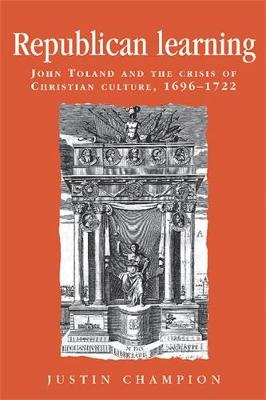Politics, Culture and Society in Early Modern Britain
1 total work
This book explores the life, thought and political commitments of the free thinker John Toland (1670 - 1722). Studying both his private archive and published works, it illustrates how Toland moved in both subversive and elite political circles in England and abroad. It explores the connections between his republican political thought and his irreligious belief about Christian doctrine, the ecclesiastical establishment and divine revelation, arguing that far from being a marginal and insignificant figure, Toland counted queens, princes and government ministers as his friends and political associates. The book argues that Toland shaped the republican tradition after the Glorious Revolution into a practical and politically viable programme, focused not on destroying the monarchy, but on reforming public religion and the Church of England. The book also examines how Toland used his social contacts to distribute his ideas in private. It explores the connections between Toland's erudition and print culture, arguing that his intellectual project was aimed at compromising the authority of Christian 'knowledge' as much as the political power of the Church.
The book illustrates how Toland's ideas and influence impacted upon English political life. It portrays a fascinating character in early modern history, of great interest to scholars and enthusiasts of the period.
The book illustrates how Toland's ideas and influence impacted upon English political life. It portrays a fascinating character in early modern history, of great interest to scholars and enthusiasts of the period.
